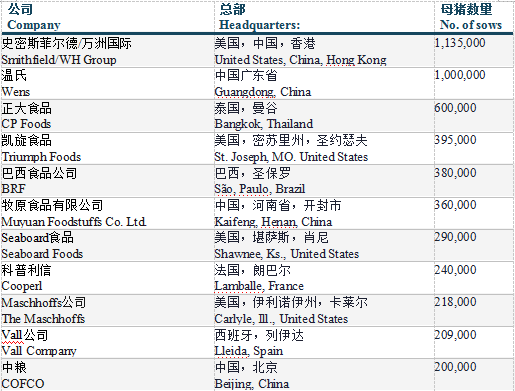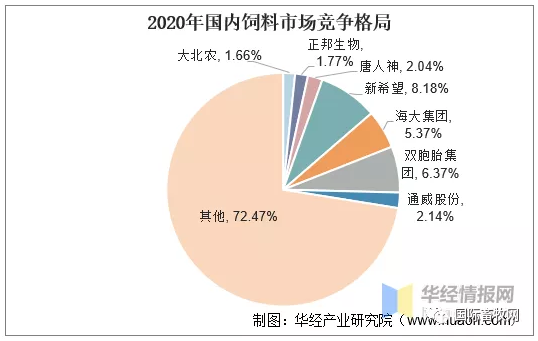俄罗斯:250斤的猪利润为680块
发布: 2017-06-28 | 作者: 佚名 | 来源: 转载
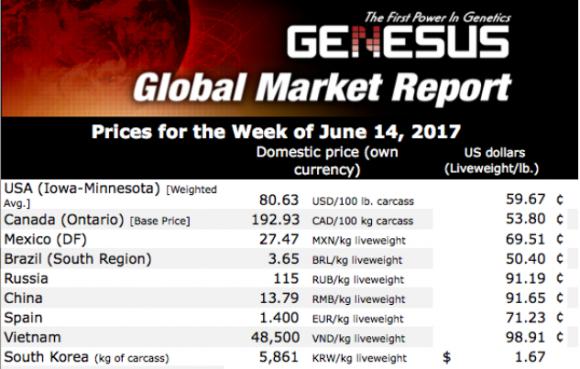
2017年6月14日周价格表
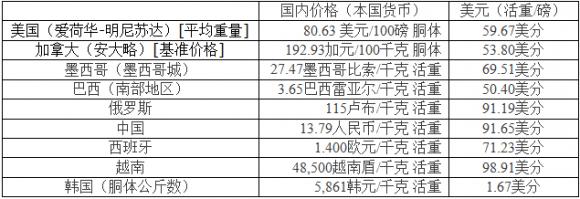
2017年6月俄罗斯市场报告
Market Report Russia June 2017.
Simon Grey 俄罗斯,独联体和欧洲区总经理
Simon Grey
General Manager Russia, CIS and Europe
simongrey@genesus.com
俄罗斯的猪价继续保持在每公斤115卢布(2.01美元)的高位。经营良好的生产商的生产成本应该是每公斤65卢布(所有成本)。一头125公斤重的生猪屠宰利润可以超过100美元。
The Russian pig Price continues to remain high at 115 Roubles ($2.01) per live kg. Good producers have a cost of production that should be 65 Roubles per kg (all costs). On a 125kg live-weight pig at slaughter means profits of over $100 per pig.
难怪还在建造新农场!
No wonder the process of building new farms continues!
高收益当然很好。然而,随之而来将会有一个巨大的危险,骄傲自满!更多的新猪场意味着更多的生猪。在某些时候,更多的生猪将意味着市场饱和。制裁也不会永远持续下去。在某些时候,欧洲的肉类将会在俄罗斯上市。最终,猪肉价格将会下跌。
High profitability is of course very nice. However, it comes with one large danger, complacency! More new farms mean more pigs. More pigs at some point will mean market saturation. Sanctions also will not last for ever. At some point, European meat will hit the market place in Russia. Ultimately pig prices will fall.
很多俄罗斯企业认为高的猪肉销售价格是理所当然的。有人猜想高价将永远保持下去,如果价格下跌,政府将直接支持养猪户。当我访问农场时,我听到了关于生产成本的讨论,但实际上并没有看到任何减少成本的措施。
Many Russian business’s take a high sales price for pigmeat for granted. There is an assumption it will last for ever, and if and when prices do fall the government will give direct support to pig farmers. I hear talk about cost of production when I visit farms, but do not actually see anything being done to reduce it.
现在这一代的养猪户和猪场管理者从未见过低于生产成本的猪价。在这种情况下,养猪知识或经验都没有任何可用之处,没人理解真正的削减成本!
There is now generation of pig farmers and farm managers who have never seen a pig price lower than the cost of production. There is no knowledge or experience of what can be done in that situation, no understanding of really cutting cost!
当猪价降低的时候,我已经看到了俄罗斯农场所有的经济学家、统计学家、会计师、董事、律师和安全员的团队,计算并决定他们可以减少生产人员,停止购买必需品,或者不管质量如何,购买能找到的最便宜的物资。但是,他们也会计算出增加自己这样人员数量的需求,因为低的价格意味着需要更多的管理!
When low prices do come, I can already see the teams of economists, statisticians, accountants, directors, lawyers and security that all Russian farms have, calculating and deciding they can reduce production staff, stop buying essential supplies, or buy the cheapest supplies they can find, regardless of quality. But, they will also calculate the need to increase their own numbers, because low prices mean more control is required!
对于那些不是来自俄罗斯的读者,阅读了这篇文章,是的,俄罗斯的养猪场有经济学家,许多会计师、律师等…他们做什么?事实上,正如我们其他人,可以在没有他们的情况下一样经营农场,答案是,我不太确定,他们的工作是除了增加成本,就是使企业能够遵守俄罗斯的法律。我访问过许多农场,那里有许多,甚至比真正和猪一起工作的人还要多的非生产人员! ! !
For those who are reading this and not from Russia, yes Russian pig farms do have economists, many accountants, lawyers etc.…… What do they do? In reality, as the rest of us can run farms without, the answer is, I am not sure, other than to add to cost and enable the business to comply to Russian legislation. I visit many farms where there are as many and even more non-production staff than people actually working with pigs!!!
本周,俄罗斯农业部长亚历山大·特卡乔夫在圣彼得堡经济论坛发表重要讲话,宣布俄罗斯必须瞄准出口市场,继续发展其养猪业务,并将重要的外国收入引入俄罗斯,以取代经济对石油和天然气的依赖。这是非常真实的。
This week Russian Minister of Agriculture, Alexander Tkachev, in an important speech at the St Petersburg Economic Forum, announced Russia must target export markets to continue to grow its pig business and to bring important foreign revenue into Russia to replace the reliance of the economy on oil and gas. This is very true.
为了成为一个净出口国,俄罗斯必须在生产成本上变得具有全球竞争力。我提到的许多养猪户都准备好迎接这一挑战,但他们需要帮助来降低企业的巨大行政负担。
To become a net exporter, Russia has to become globally competitive on cost of production. Many pig farmers I speak with are ready for this challenge, but need help lowering the massive administrative burden on their business.
当然,为了扩大市场和盈利,削减成本还有另一个方式。就是提高销量和销售价格。这就需要生产的产品,人们想要购买更多,并且愿意为此付出更多的钱!
Of course, there is another side to cost cutting to grow markets and to make a business profitable. That is to increase sales and sales price. This requires producing a product that people want to buy more of and are happy to pay more for!
在欧洲和北美,猪肉的消费量十分的稳定。作为一个需要增加销量的行业,我们显然是失败的。我不相信这真的是一个成本问题。英国这几年,外出就餐在食物上花的钱增加了50%以上。美国今年达到了这个基准。外出就餐比在家里自己做饭要贵得多。当然,在我们现代忙碌的生活中,存在着一个方便(或便利)的问题。即使是这样,如果你看一下开车去餐馆,再开车回家的时间,要比你自己做饭花上更长的时间。
In Europe and North America pig meat consumption is at best static. We are clearly failing as an industry to increase sales. I do not believe this is really an issue with cost. For several years in the UK, the amount of money spent outside the home on food is greater than 50%. The USA reached this benchmark this year. Eating out is much more expensive than making food yourself at home. Of course, there is an issue with convenience (or perception of convenience) in our modern busy lives. Even then, if you look at the time it takes to drive to a restaurant and drive home again, it would take longer then cooking something yourself!
欧洲花费了过去10年或者更长的时间,增加在动物福利和环境方面立法,因为人们认为这是人们想要的。这些影响销售吗?零。如果这真的是消费者想要的,那么销量就会增加。一直在持续进行的调查,询问人们是否愿意为被认为是标准的食品支付更多的钱。在一个政治正确的世界里,人们不再陈述自己的真实想法,答案是肯定的。看相同类型的人们购物车里的东西,完全不同的内容。
Europe has spent the past 10 years or more increasing legislation on animal welfare and the environment, because of the perception that this is what people want. Any effect on sales? Zero. If this is really what the consumer wanted then sales would increase. There have been and continue to be surveys asking people if they would pay more for food raised to a perceived standard. In a world of political correctness, where people no longer state their real opinion of course the answers are yes. Look at the contents of the same peoples shopping trollies and there is a totally different picture.
现在,欧洲想要禁止阉割。结果当然是在餐馆和商店里有更多带有公猪膻味的猪肉。这对猪肉消费有什么影响?只有一个结果,减少销量!我们饲养动物的祖先并不是因为喜欢折磨动物才开始阉割公猪、去齿和断尾。公猪被阉割,是因为很多人不喜欢吃带有猪肉膻味的猪肉。去齿和断尾是为了减少猪群相互之间的伤害。
Now Europe wants to ban castration. The result will of course be more pig meat with boar taint in restaurants and shops. What will this do to pig meat consumption. Only one thing, reduce it! Our forefathers who farmed animals did not start castrating pigs, cutting teeth and tails because they enjoyed torturing animals. They castrated, because many people do not like to eat boar tainted pig meat. Teething and tailing was to reduce damage caused by pigs on each other.
所以人们为什么不食用更多的猪肉,也许是因为味道!!作为一个行业,我们需要回顾人工饲养猪肉市场上我们把自己放在了哪里。
So why are people not eating more pig meat, maybe taste! As an industry, we need to look at where we have placed ourselves in the market place for farmed meat.
另一端,我们有便宜的,瘦的,经常是干柴而且没有味道的肉,需要酱汁和调味料来调味。鸡肉和火鸡很成功地填补了市场的这部分。猪肉最糟糕的营销计划之一是在美国,在那里猪肉被称为“另类白肉”。这只被英国的一项营销计划所超越,旨在向公众表明,他们应该购买不吃肉类和骨粉的英国猪肉。这句口号是,“当母猪喂完她的小猪时,母猪不会被用来饲喂小猪们”。所有这类营销都是让人们询问吃猪肉,结果他们吃得更少。
At one end, we have cheap lean and often dry and tasteless meat, that needs sauce and flavouring to be tasty. Chicken and turkey fill this part of the market very successfully. One of the most ill-conceived marketing plans of all time was in America, where pork was branded as ‘the other white meat’. This was only surpassed by a marketing plan in the UK aimed at showing the public that they should by British pork that was not fed meat and bone meal. The slogan, ‘when the sow has finished feeding her piglets she will not be fed to them’. All this type of marketing does is make people question eating pig meat and as a result they eat less.
在另一端,规模的另一端我们有优质牛肉。对许多人来说,牛肉是针对特殊场合的一件奢侈品。
At the other end, other end of the scale we have prime beef. For many people, a luxury item for special occasion.
猪肉的位置在哪里?今天,不幸的是,跟鸡肉差不多。在许多餐馆的菜单上,相当低的成本而且往往是没有味道的产品是没有特点的。当然,也有猪肉的成功故事。例如培根。没有人能从任何其他的肉中重新创造出味道像培根那样酥脆的熏肉!这是素食者回归肉类的第一件事!
Where does pig meat sit? Today, sadly nearer to chicken. A lowish cost dry and also often tasteless product that does not feature on many restaurant menus. Of course, there are pig meat success stories. Bacon for example. Nobody can recreate from any other meat something that tastes as good as a crispy rasher of bacon! It is the number one thing that vegetarians revert back to meat for!
一份完美大理石花纹的猪排煎至五分熟(中间部分为粉色),跟你能买到的任何牛排一样好。它不仅美味可口,而且生产成本更低。销售像牛肉一样美味的猪肉,但以稍微低一点的成本,似乎是增长生猪肉类消费和价格的明显途径。
A well marbled pork steak cooked medium (pink in the middle) is as good as any beef steak you can buy. It is just as juicy and tasty, but with a much lower cost of production. Marketing pork as tasty as beef, but at a slightly lower cost seems the obvious way to grow pig meat consumption and price.
当然,营销一件产品意味着它实际上必须达到预期的标准。加裕公司作为一家育种公司,在追求更好的猪肉品质方面是独一无二的。对于我们行业的大部分如今仍然如此(理解我们不增加猪肉消费量)肉质的测量是更薄的背膘。我们的消费者正在清楚地告诉我们,这并不是促使他们购买更多猪肉的原因。
Of course, marketing a product to be something means it actually has to come up to the standards expected. Genesus as a breeding company is unique in its pursuit of better meat- eating quality. For most of our industry still today (understanding we are not increasing pig meat consumption) the measure of quality is lack of backfat. Our consumers are clearly telling us that this is not what will them to buy more pig meat
真正的食用肉品质是鲜嫩和美味。pH、肌内脂肪含量、剪切力都是对猪肉质量有积极作用的可测量的因素。自1998年以来,加裕公司一直在测量其杜洛克群体中的这些性状。几年来,加裕公司已经能够通过针对需要优质猪肉性质的特定市场(西班牙的伊比利亚火腿生产)来选择父本。首次,猪肉品质现在是父系指数标准的一部分。
Real meat-eating quality is tenderness and taste. pH, intra muscular fat, shear force are all measurable factors that contribute positively to pig meat eating quality. Since 1998 Genesus have been measuring these traits within its Duroc population. For several years Genesus have been able to select sires with premium meat-eating quality for specific markets that require this (Ibirica production in Spain). For the first time, meat quality is now part of the standard Sire Line index.
基因公司不得不考虑5年内市场的预期。多年来,加裕公司一直认为增加猪肉的销售需要优质风味的猪肉。这就是为什么在没有经济回报的情况下,股东们对测量这些性状进行了多年的投资。
Genetic companies are having to look at where the market is expected to be in 5 years-time. For many years Genesus has believed that to increase pork sales requires superior tasting pig meat. That is why the shareholders have invested in measuring these traits for many years, when there has been no economic return.
市场已经说话了。它说,它将购买减少脂肪生产的瘦无味道的猪肉,但它肯定不会买更多的肉!美国许多屠宰场已经意识到这一现实,不再支付给养猪户去生产更瘦的猪肉。
The market has spoken. It says that it will buy the lean tasteless pig meat that reducing fat has produced, but it is certainly not going to buy more of it! In the United States many slaughter plants have realised this reality and no longer pay farmers to produce leaner pig meat.
市场会对味道更好的猪肉做出反应吗?现在所有的指标都是肯定的,但时间会证明一切。当然,继续保持的更瘦型猪肉和更瘦型的途径并没有增加销量。
Will the market respond to tastier pig meat. Today all of the indicators are yes, but time will tell. For sure continuing down the leaner and leaner route has not increased sales.
一个简单的生活规则。“如果你什么都不改变,那么什么都不会改变。”最终,作为养猪户,我们的顾客是吃我们生产的猪肉的消费者。屠宰场只是通过一道加工赚钱。超市想要在每平方米的货架空间获得最大化的销售和利润。我们的屠宰场和超市仍然跟我们要更瘦的猪。我们的终端消费者说法不同!
A simple life rule. ‘If you change nothing, then nothing will change’. Ultimately as pig farmers our customers are the consumers who eat the meat we produce. A slaughter plant makes its money doing a process. Supermarkets want to maximise sales and profit per m2 of shelf space. Our slaughter plants and supermarkets still tell us leaner pigs. Our ultimate consumers say different!
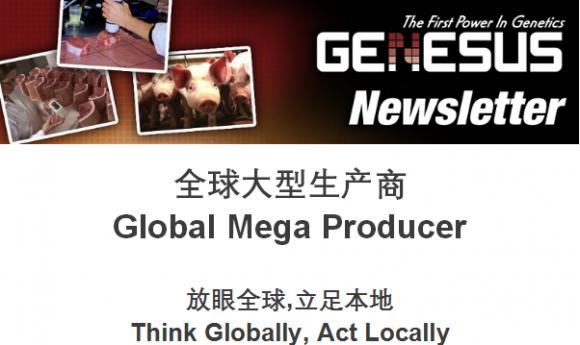
在世界猪肉博览会上,加裕公司与《全国养猪农》联合发起了全球大型生产商计划。此项计划认可了拥有超过10万头母猪的全球生产商。
At the WPX Genesus in conjunction with the National Hog Farmer launched the Global Mega Producer Initiative. The Initiative recognizes the Global Producers over 100,000 sows.
全球大型生产商名单
Global Mega Producer List
